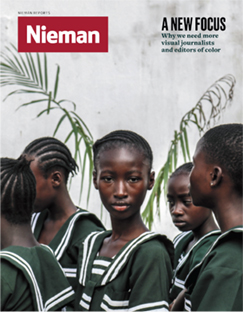Two years ago, the Pittsburgh Post-Gazette gave me the reporting opportunity of a lifetime—go to the Dominican Republic and Cuba to write about the dynamics of the baseball culture on each island. In Cuba, I would also report on the everyday life of the average Cuban family, taking readers behind the facade of the tourist-packed boulevards of Havana.
Our photographer and I did not get journalist visas to work in Cuba, so we boarded our flight in Santo Domingo with plans for what we would say when inevitably stopped at customs. We would stick to the story that we were graduate students doing research. But what if we were caught in that lie?
A young woman approached us immediately and, for some reason, her first question jarred me: What is your profession?
“I write about sports,” I finally said, my nerves burning right through our plan.
I assumed our trip was now doomed. Here was our photographer with his equipment visible and me, the guy openly admitting to being an American journalist. I spent the next half hour looking over my shoulder, resigned to having to wrangle my way through extra questioning.
But, while the Cubans would hold up our photographer and question him for more than an hour, I picked up my luggage and walked right through the sliding doors into Cuba.
Halfway through my Nieman year, that moment came to hold more meaning than I had previously attached to it. Before, it was just a funny story to tell people who were curious about our potentially perilous journey into Castro’s Cuba. But after the election of Donald Trump as our president and the ensuing tearing down of the media as the “enemy of the people,” I found myself wondering: Why would the Cubans not question a sportswriter?
All of us at Lippmann House were busy trying to figure out what Trump’s win meant for the country, for journalism, and for us individually. In the months before coming to Cambridge, I had been given a new role at the Post-Gazette that allowed me to do projects in news as well as sports, a big step for a guy who had come up through the traditional sportswriting path but had quickly fallen in love with immersive reporting and narrative writing. The last thing I wrote before the fellowship was on the human toll of the opioid epidemic in Appalachia.
Sports are, for better or worse, our best shot to encourage empathy
Early on, I made it clear to the fellows that I was not just a sportswriter because I did not know how I would be viewed. There have only been a few of us chosen as fellows, and, while I know that some of the best narrative writers were molded by the literary tradition of sportswriting, I wasn’t sure anybody else in the program would.
Trump’s victory taught us all lessons, some of which will take years to fully grasp. One of them that I took personally was the idea that there had not been enough empathy in our coverage of what the real issues were for the American people— that there were millions out there who felt they were not heard by mainstream media and therefore were seeking their news from alternative sources who spoke their language.
By late January when Trump had taken over the White House and media access was under attack, I kept going back to Cuba.
The young woman in the Havana airport did not see a sportswriter as a threat. But, instead of being offended by that, I began to see the power in it.
Trust equals access, and I am more trustworthy because I write about sports. It had been that way a few years earlier, too, as I spent nearly a year reporting about three teenagers with mental-health issues who were forced to attend a special school. Looking back, I felt confident the only reason I was given access inside the school’s high-security walls was because I had approached the topic through spending time around the school’s basketball team.
All of a sudden, being “just a sportswriter” felt pretty good.
My passion has always been to use sports—and this nation’s unhealthy obsession with them—as a vehicle to bring people into worlds they otherwise wouldn’t go.
Think of all the people out there who only read the sports page. Think of all the stadiums and arenas packed nightly across the country with thousands of Americans who may bring conflicting beliefs to their seats but will high-five and hug each other without hesitation when their team makes a big play.
Our country is divided, and there aren’t as many organic ways to bring people who think differently together as there used to be. Sports are, for better or worse, our best shot to encourage empathy.
Now, I am not saying that sportswriting needs to be politicized. We don’t need political hot takes in game stories. But to ignore the powerful platform we have to listen to people and tell stories that will resonate with our diverse audience would be a missed opportunity for the industry.
I am thinking about the future and where I’m headed. There are big questions to answer—and none bigger than this one:
What is my profession?
I write about sports.


